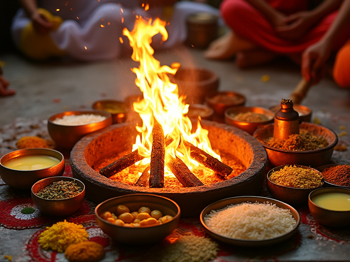The New Business Puja & Havan holds profound significance in Hindu culture, reflecting deep-rooted spiritual beliefs and practices. The ceremony is performed to honor deities like Lord Ganesha, the remover of obstacles, and Goddess Lakshmi, the harbinger of wealth and prosperity. By conducting this puja, the business owner expresses devotion and seeks divine blessings to ensure a smooth and successful operation of the business. The Havan, or the fire ritual, is considered a powerful method to purify the surroundings and invoke positive energies, thus creating a conducive environment for growth and success.
This ritual not only signifies respect for traditional values but also instills a sense of positivity and confidence in the business owner, employees, and all associated with the venture.
-
Divine Blessings: Invokes the blessings of deities, ensuring that the business is protected from negative influences and is guided towards success.
-
Removal of Obstacles: Performing the Puja, especially with prayers to Lord Ganesha, helps in removing any potential obstacles or challenges that may arise in the business.
-
Prosperity and Wealth: The ritual is believed to attract wealth and prosperity, ensuring that the business flourishes and remains financially stable.
-
Positive Energy: The Havan purifies the environment, filling the business premises with positive energy, which is essential for creating a harmonious workplace.
-
Spiritual Protection: The ceremony acts as a spiritual shield, protecting the business from any harm, negative energies, or evil eyes that may affect its growth.
-
Employee Morale: The Puja fosters a sense of unity and positivity among employees, enhancing their morale and encouraging a productive work atmosphere.
-
Cultural Respect: Upholding and respecting cultural and traditional values through the Puja can enhance the reputation of the business in the community, fostering goodwill and trust.
-
Long-Term Success: By seeking divine intervention right at the start, the Puja sets a strong foundation for the business, promoting long-term stability and success.
Performing a New Business Puja and Havan is a significant event meant to invoke blessings from the divine for prosperity, success, and smooth operations of the new venture. Here is a step-by-step procedure to perform this ritual:
1. Preparation Phase
- Select an Auspicious Date: Consult a priest or an astrologer to choose an auspicious date (Muhurta) for the Puja and Havan.
- Clean the Premises: Ensure the business premises are thoroughly cleaned, including the office space, factory, or store where the Puja will take place.
- Gather Materials:
- Kalash (a copper or brass pot filled with water)
- Mango leaves
- Coconut
- Fresh flowers
- Incense sticks (Agarbatti)
- Sandalwood paste and turmeric
- Ghee (clarified butter)
- Navagraha (nine planetary deities) idols or symbols
- Grains (rice, wheat, etc.)
- A sacred thread (Mouli)
- Fruits and sweets for offering
- Wood and samagri (herbal mixtures) for Havan
2. Setting up the Altar
- Prepare the Altar: Set up a clean space for the Puja, ideally in the northeast corner of the premises. Place the idols of Lord Ganesha, Goddess Lakshmi, and any other deities you worship.
- Arrange the Kalash: Place the Kalash filled with water in the center of the altar, topped with a coconut and mango leaves. The Kalash represents divine energy.
- Decorate the Space: Use flowers, Rangoli, and other decorative items to beautify the space.
3. Invoking Lord Ganesha
- Ganesh Puja: Begin with a prayer to Lord Ganesha, the remover of obstacles. Offer flowers, sandalwood paste, and sweets while chanting Ganesh mantras like "Om Gan Ganapataye Namah."
- Aarti: Perform Aarti by rotating a lit lamp in front of Lord Ganesha.
4. Sankalpa (Vow of Intention)
- Take a Sankalpa: This is a vow or intention taken by the business owner to seek blessings for the new venture. The priest will guide you in taking the Sankalpa, where you state your name, the purpose of the Puja, and the date.
5. Navagraha Puja
- Navagraha Invocation: Worship the nine planetary deities (Navagrahas) by offering flowers, rice, and chanting their respective mantras. This is done to seek planetary alignment and positive influences on the business.
6. Lakshmi Puja
- Invoke Goddess Lakshmi: Offer prayers to Goddess Lakshmi, the goddess of wealth and prosperity. Use flowers, turmeric, sandalwood paste, and sweets. Chant Lakshmi mantras like "Om Shreem Mahalakshmiyei Namah."
- Aarti: Perform Aarti with a lit lamp.
7. Havan (Fire Ritual)
- Prepare the Havan Kund: Set up the Havan Kund (a square or round fire pit) with wood and samagri in the center of the altar.
- Start the Fire: Light the fire in the Havan Kund using camphor or ghee-soaked cotton wicks.
- Offerings to Fire: Offer ghee, samagri, and grains into the fire while chanting mantras. Common mantras include the Gayatri Mantra and other Vedic hymns. Each offering is made with the chant of "Swaha."
- Purnahuti: The final offering to the fire is done with full devotion, marking the end of the Havan. It is usually a larger amount of samagri or ghee.
8. Aarti and Prasad
- Conclude with Aarti: Perform a final Aarti for all the deities invoked during the Puja. Sing devotional songs and rotate the lit lamp in front of the idols.
- Distribute Prasad: Offer the fruits, sweets, and any other offerings (Prasad) to everyone present.
9. Conclusion
- Seek Blessings: Bow down and seek blessings from the priest, elders, and all present.
- Business Inauguration: You may proceed with the formal inauguration of the business, such as opening the door, cutting a ribbon, or making the first transaction.
10. Post-Puja Rituals
- Donation: It is customary to give donations or feed the poor after the Puja. This act of charity is believed to bring prosperity and good fortune.
- Invite Guests: You may invite family, friends, and well-wishers to share the joy and seek their blessings.
11. Special Notes
- Presence of Priest: It is highly recommended to have a knowledgeable priest conduct the Puja and Havan, as they will guide you through the correct procedures and mantras.
- Dress Code: Wear clean and traditional attire, preferably new clothes, for the ceremony.
This ritual is not just about religious practices but also about starting your business with positive energy and divine blessings.




